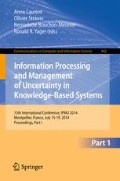Abstract
In this work, the class of fuzzy polynomial implications is introduced as those fuzzy implications whose expression is given by a polynomial of two variables. Some properties related to the values of the coefficients of the polynomial are studied in order to obtain a fuzzy implication. The polynomial implications with degree less or equal to 3 are fully characterized. Among the implications obtained in these results, there are some well-known implications such as the Reichenbach implication.
Access this chapter
Tax calculation will be finalised at checkout
Purchases are for personal use only
Preview
Unable to display preview. Download preview PDF.
References
Alsina, C., Frank, M., Schweizer, B.: Associative functions. Triangular norms and copulas. World Scientific Publishing Company, Singapore (2006)
Baczyński, M., Beliakov, G., Bustince, H., Pradera, A.: Advances in Fuzzy Implication Functions. STUDFUZZ, vol. 300. Springer, Heidelberg (2013)
Baczyński, M., Jayaram, B.: Fuzzy Implications. STUDFUZZ, vol. 231. Springer, Heidelberg (2008)
Bustince, H., Fernandez, J., Sanz, J., Baczyński, M., Mesiar, R.: Construction of strong equality index from implication operators. Fuzzy Sets and Systems 211, 15–33 (2013)
Fodor, J.: On rational uninorms. In: Proceedings of the First Slovakian–Hungarian Joint Symposium on Applied Machine Intelligence, Herlany, Slovakia, pp. 139–147 (February 2003)
Fodor, J.C., Roubens, M.: Fuzzy Preference Modelling and Multicriteria Decision Support. Kluwer Academic Publishers, Dordrecht (1994)
Hamacher, H.: Ein axiomatischer Beiitrag zur normativen Entscheidungstheorie. In: Über logische Aggregationen nicht binär explizierter Entscheidungskriterien. Verlag, Frankfurt (1978)
Mas, M., Monserrat, M., Torrens, J., Trillas, E.: A survey on fuzzy implication functions. IEEE Transactions on Fuzzy Systems 15(6), 1107–1121 (2007)
Massanet, S., Torrens, J.: On the characterization of Yager’s implications. Information Sciences 201, 1–18 (2012)
Massanet, S., Torrens, J.: An overview of construction methods of fuzzy implications. In: Baczynski, M., Beliakov, G., Bustince, H., Pradera, A. (eds.) Adv. in Fuzzy Implication Functions. STUDFUZZ, vol. 300, pp. 1–30. Springer, Heidelberg (2013)
Trillas, E., Mas, M., Monserrat, M., Torrens, J.: On the representation of fuzzy rules. Int. J. Approx. Reasoning 48(2), 583–597 (2008)
Author information
Authors and Affiliations
Editor information
Editors and Affiliations
Rights and permissions
Copyright information
© 2014 Springer International Publishing Switzerland
About this paper
Cite this paper
Massanet, S., Riera, J.V., Ruiz-Aguilera, D. (2014). On Fuzzy Polynomial Implications. In: Laurent, A., Strauss, O., Bouchon-Meunier, B., Yager, R.R. (eds) Information Processing and Management of Uncertainty in Knowledge-Based Systems. IPMU 2014. Communications in Computer and Information Science, vol 442. Springer, Cham. https://doi.org/10.1007/978-3-319-08795-5_15
Download citation
DOI: https://doi.org/10.1007/978-3-319-08795-5_15
Publisher Name: Springer, Cham
Print ISBN: 978-3-319-08794-8
Online ISBN: 978-3-319-08795-5
eBook Packages: Computer ScienceComputer Science (R0)

